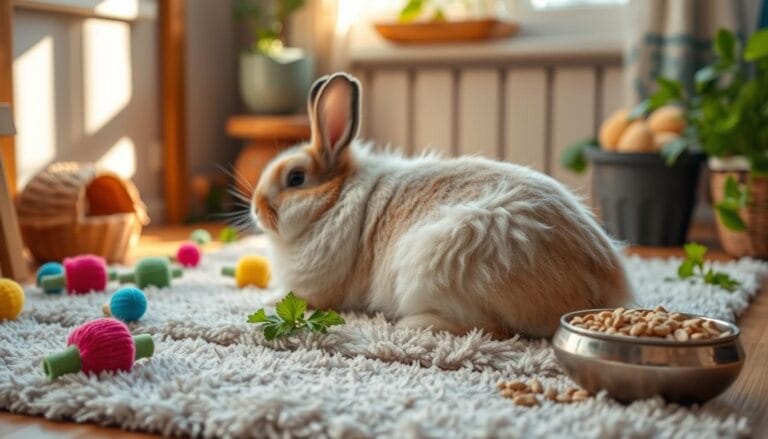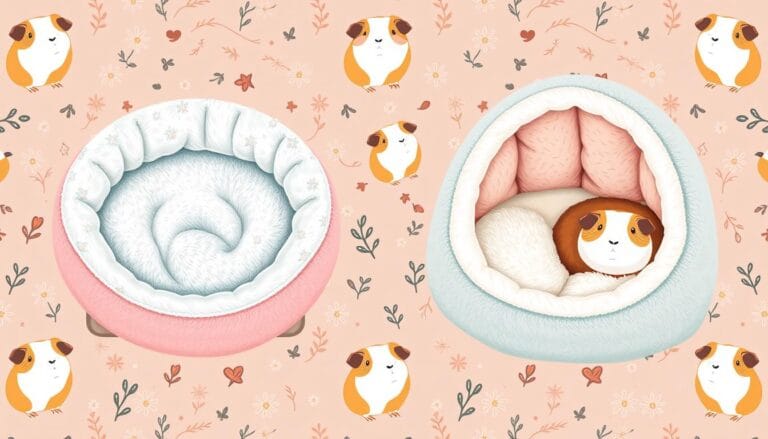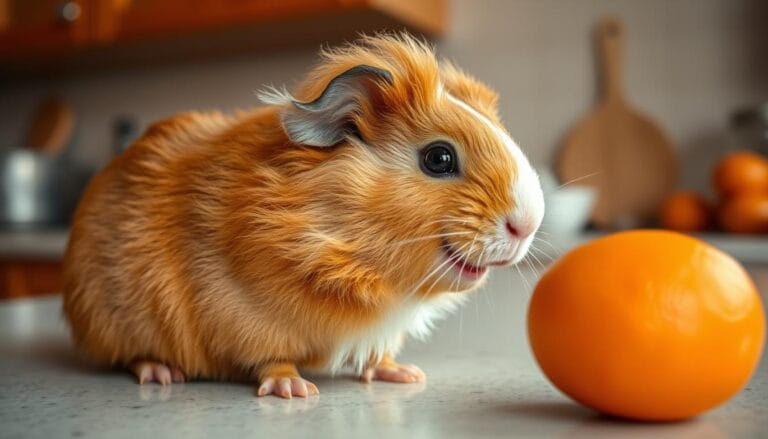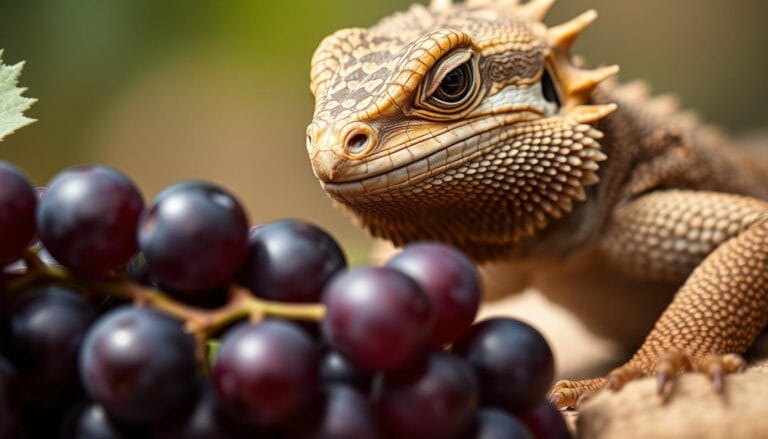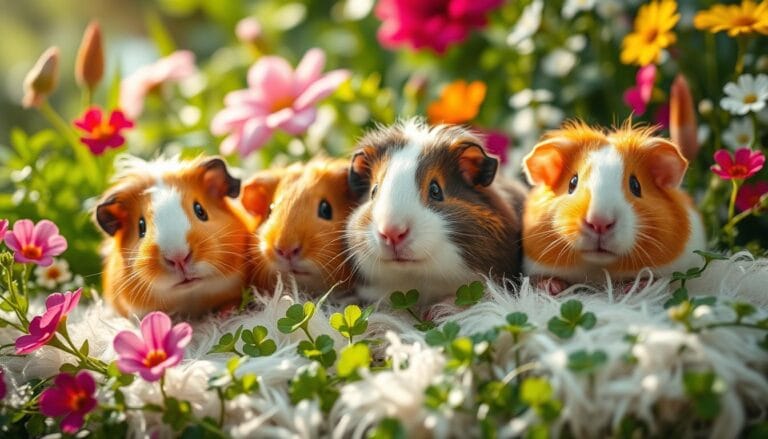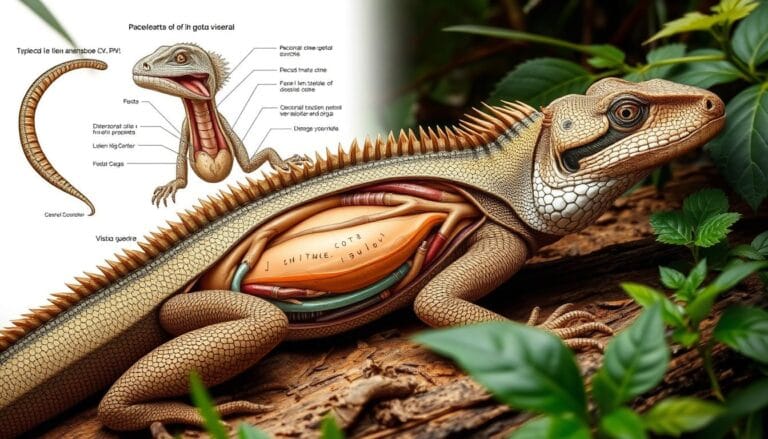Rabbit Poop: Discover Secrets of Healthy Droppings
As a rabbit owner, you want your furry friend to be healthy and happy. One key way is to watch their rabbit poop. Rabbit poop can reveal a lot about their health. The size, shape, and color of their poop can show if there are health problems.
Table of Contents
By paying attention to your rabbit’s poop, you can spot issues early. This helps prevent more serious problems. It’s important to understand what healthy rabbit poop looks like.
Healthy rabbit poop is usually between 7mm to 12mm in diameter. Its color can be dark brown to a lighter tan or wheat. Many things can affect rabbit poop, like diet, hydration, and health.
Knowing what normal rabbit poop looks like is key. It helps you spot and fix any problems. Whether you’re new to owning rabbits or have experience, learning about their poop is vital.
Key Takeaways
- Monitoring your rabbit’s poop is key for spotting health issues
- Healthy rabbit poop is round, hard, and can be dark brown to tan
- The size and shape of rabbit poop can show digestive health and possible problems
- Diet and hydration greatly affect rabbit poop quality
- Understanding rabbit poop can help find health problems early
- Checking your rabbit’s poop regularly is important for their care
- Rabbit poop can show overall health, and changes should be taken seriously
Understanding Normal Rabbit Poop Characteristics
As a rabbit owner, knowing what rabbit poop looks like is key. This knowledge helps keep your pet healthy. Normal rabbit poop is a sign of good health. Spotting any changes early can prevent bigger problems.
Rabbits have two kinds of droppings: fecal pellets and cecotropes. Fecal pellets are small, round, and dry. Cecotropes are soft, shiny, and smell strong. Knowing the difference helps you understand your rabbit’s health.
- Size: Fecal pellets are the same size. Cecotropes are bigger and look like grapes.
- Color: Fecal pellets are light. Cecotropes are dark brown or black.
- Texture: Fecal pellets are dry. Cecotropes are soft and shiny.
By noticing these traits, you can tell if your rabbit’s poop is normal. Knowing what rabbit poop looks like is important for your pet’s health.
The Different Types of Rabbit Droppings You Should Know
As a rabbit owner, it’s key to know about the different droppings your pet makes. Rabbits have two main types: fecal pellets and cecotropes. Fecal pellets are round, firm, and dry. Cecotropes are soft and full of nutrients, which rabbits eat again for more nutrients.
When you compare deer poop vs rabbit poop, rabbit droppings are more varied. They are vital for a rabbit’s diet.
A healthy rabbit’s fecal pellets are uniform in size, like tiny marbles. They are dark brown or black. Cecotropes are sticky and squishy, showing good digestion. It’s important to watch your rabbit’s droppings for any changes. Changes in color, consistency, or frequency can mean health issues.
For example, a sudden change in poop or a bad smell can mean digestive problems. Knowing the differences between deer poop vs rabbit poop helps you understand your rabbit’s droppings better.
There are key differences between deer poop vs rabbit poop. Rabbit droppings are smaller and more uniform. Deer droppings are larger and irregular. Rabbit droppings are darker, from medium green to almost black. Deer droppings are lighter.
By knowing these differences, you can better watch your rabbit’s health. This helps you make good choices about their diet and care.
It’s important to notice the consistency and regularity of your rabbit’s droppings. A poop chart can help track changes in digestion and health. Knowing about the different types of rabbit droppings helps you keep your pet’s digestive health good. This is important when comparing deer poop vs rabbit poop.
What Your Rabbit’s Poop Reveals About Their Health
As a rabbit owner, you might wonder why do rabbits eat their poop and what it means for their health. Watching your rabbit’s poop is key to spotting health problems early. A healthy rabbit’s poop is round, firm, and dry, looking like tiny marbles. But, do rabbits eat their poop can show they’re not getting enough nutrients or have other health issues.
A diet rich in hay is vital for a rabbit’s digestion and healthy poop. Hay should be 70-80% of their diet. If their pellets are dry and crumble right away, it might mean they’re dehydrated. Small poop can also mean they’re in pain or stressed, leading to changes in stool size.
- Diarrhea, which can cause dehydration quickly
- Small, misshapen, or mushy poop, indicating health issues
- Presence of blood or mucus in feces, requiring immediate veterinary attention
- Lack of rabbit poop for a few hours, which may indicate an impacted digestive system or other serious health concerns
By keeping an eye on your rabbit’s poop, you can understand do rabbits eat their poop and why do rabbits eat their poop can tell you about their health. This helps you catch health problems early and care for your rabbit’s well-being.
Deer Poop vs Rabbit Poop: Key Differences Explained
When you see poop in your yard, it’s important to know who left it. Deer poop is bigger and longer than rabbit poop. Rabbit poop is smaller and rounder, about 1/4 inch long and 1/8 inch wide.
Rabbits can make a lot of poop, up to 600 pellets a day. Deer poop is about 1/2 to 3/4 inch long and 1/4 to 1/2 inch wide. The color of deer poop can change, from dark brown to black, reddish, yellowish, light tan, and grayish. Rabbit poop is always dark brown and dry.
Here are some main differences between deer and rabbit poop:
- Size: Deer poop is bigger than rabbit poop
- Shape: Deer poop is longer, while rabbit poop is rounder
- Color: Rabbit poop is always dark brown, deer poop can be different colors
- Texture: Rabbit poop is dry and hard, deer poop is softer
Knowing the difference between deer and rabbit poop helps you understand who’s visiting your yard. This is useful for gardeners, hunters, and nature lovers. It’s a skill that can help you manage wildlife in your area.
The Fascinating Process of Coprophagy: Why Do Rabbits Eat Their Poop?
Rabbits have a unique behavior called coprophagy, where they eat their own poop. But why do rabbits eat their poop? They do this to get more nutrients from hard plant materials. About 35 to 50% of their poop is undigested food, showing how important it is for their diet.
When you ask do rabbits eat their poop, the answer is yes. This habit is key to their health. Rabbits have two types of droppings: hard pellets and soft pellets, or cecotropes. The cecotropes are full of nutrients and are eaten by the rabbit. This helps them get all the nutrients from their food.
Understanding Cecotropes
Cecotropes are soft, nutrient-rich pellets made by the rabbit’s digestive system. They are a vital part of a rabbit’s diet. Rabbits eat them to get as many nutrients as possible from their food.
Health Benefits of Natural Coprophagy
Natural coprophagy has many health benefits for rabbits. It improves digestion and nutrient absorption. This behavior is essential for a healthy gut and preventing digestive issues.
Diet’s Impact on Rabbit Poop Quality
As a rabbit owner, you know diet is key to your pet’s health, including their poop. A diet rich in fiber and low in sugar is best for healthy rabbit poop. The cause of rabbit type poop can vary, but food type is a big factor. Fresh hay, like 1st Cut Timothy hay, should make up 70-80% of their diet. It’s full of fiber and keeps their digestive system healthy.
A balanced diet can stop problems like small poop, which might mean pain, parasites, impaction, or malnutrition. Clumpy poop could mean not enough fiber. Changes in poop color can happen with diet changes. Dark poop might mean too much protein. Always watch your rabbit’s poop and see a vet if it’s different.
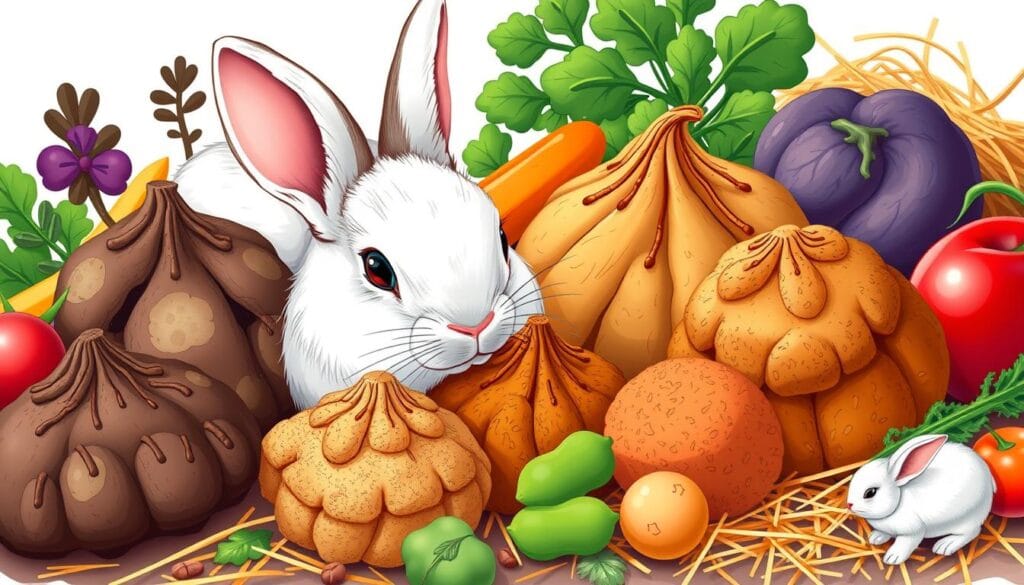
- Fiber content: A high-fiber diet keeps the digestive system healthy and promotes regular bowel movements.
- Sugar intake: A low-sugar diet helps avoid diarrhea and other digestive problems.
- Hydration: Make sure your rabbit drinks plenty of fresh water to prevent dehydration and keep poop healthy.
By giving your rabbit a balanced diet and watching their poop, you can avoid health problems. A healthy diet is key for good rabbit poop. Knowing the cause of rabbit type poop helps you make better choices for your pet’s care.
Common Causes of Abnormal Rabbit Droppings
As a rabbit owner, watching your pet’s droppings is key to their health. Abnormal droppings can signal a health problem. Rabbit poop is usually round and varies in size from pea to garbanzo bean. But, diet, environment, or health changes can alter what their poop looks like.
Dietary problems, like sudden food changes or nutrient imbalances, can cause odd droppings. For instance, a low-fiber diet might result in small, dry pellets. On the other hand, a diet rich in sugar can lead to soft, wet droppings. Stress from environmental changes or health issues like parasites can also affect their droppings.
Some common signs of abnormal droppings include:
- Small, round pellets that are dry and crumbly
- Large, egg-shaped pellets that are soft and wet
- Pellets with a strong, unpleasant odor
- Mucous-covered pellets or pellets with a thick, stringy mucous
If you see these signs, it’s time to see a vet. A healthy rabbit should have 200 to 300 pellets a day. Any big changes in droppings mean there might be a problem. By watching your rabbit’s droppings and acting fast, you can keep them healthy and happy.
Maintaining Healthy Rabbit Digestion: Prevention Tips
Maintaining healthy digestion in rabbits is crucial for their overall well-being, and understanding the nuances of their digestive process can help prevent a myriad of health issues. One of the most significant signs of digestive health is the condition of rabbit poop.
Rabbit poop typically comes in two forms: round, dry fecal pellets and softer cecotropes. The latter is produced in the cecum and is rich in nutrients, which rabbits consume directly for optimal nutrition. To gauge your rabbit’s digestive health, it’s beneficial to study rabbit poop pictures online, as they can visually demonstrate what healthy droppings should look like, helping you identify any abnormalities.
A balanced diet is the cornerstone of healthy rabbit digestion. Rabbits thrive on a diet that predominantly consists of hay, which is high in fiber. This fiber is essential because it promotes healthy gut motility and encourages the formation of the right type of droppings. Fresh vegetables can complement their diet, but it’s crucial to introduce new greens slowly to avoid digestive upset. Additionally, limited amounts of high-carbohydrate pellets are acceptable, yet these should not dominate their meals. Ensuring that your rabbit has constant access to clean water is also vital, as hydration plays a key role in digestion.
Regular exercise is another important factor in maintaining digestive health. Rabbits are naturally active creatures, and providing them with ample space to hop, run, and explore helps keep their digestive systems functioning optimally. Physical activity aids in the proper movement of food through their gastrointestinal tract, reducing the risk of complications such as gastrointestinal stasis. Observing your rabbit’s activity levels can also provide insights into their digestive health; a lethargic rabbit may indicate an underlying issue that requires immediate attention.
Lastly, routine health check-ups with a veterinarian who specializes in rabbits can be invaluable for preventive care. Regular vet visits can help catch any potential gastrointestinal problems before they escalate. During these visits, your vet can guide you on dietary adjustments, behavioral observations, and overall care strategies to ensure your rabbit maintains optimal digestive health. By staying vigilant about your rabbit’s diet, exercise, and overall health, you can reduce the likelihood of digestive issues and promote a happy, thriving pet.
To keep your rabbit’s digestive system healthy, focus on prevention. Offer a diet rich in hay or grass, making up 70-80% of their food. Also, give them a variety of safe leafy greens. Aim for one bundle of hay the size of your rabbit daily, plus a big handful of greens.
A balanced diet is key to avoiding digestive problems like gut stasis. This can happen from too little fiber or not enough water. Watch your rabbit’s poop closely. Changes in color or consistency can mean health issues. If you see soft or runny stools, see a vet to find out why.
Regular exercise is also important for your rabbit’s digestion. Make sure they have room to move and play. Add toys or obstacles to keep them active. A healthy, active rabbit is less likely to have digestion problems, and their poop will show it.
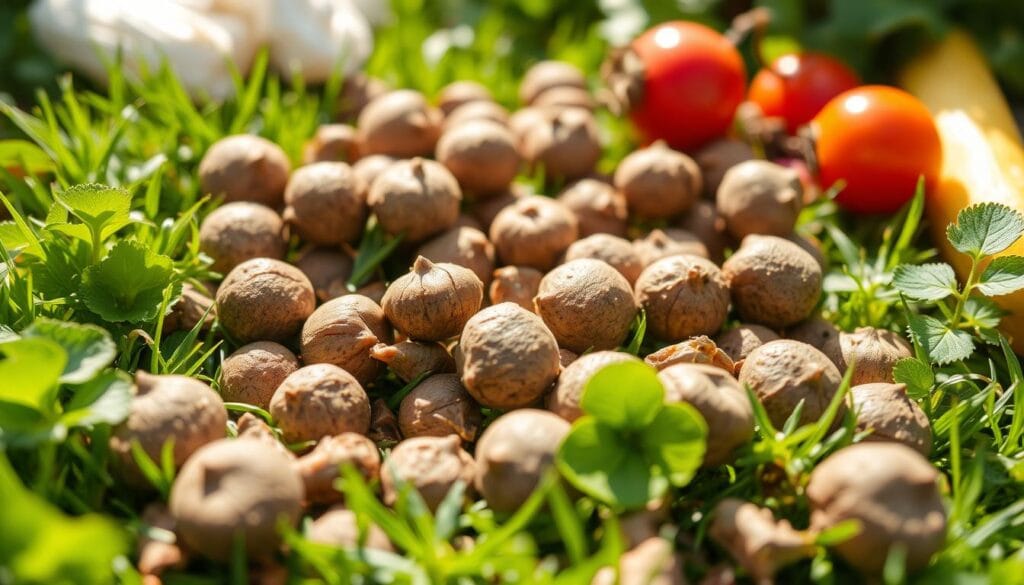
By following these tips, you can keep your rabbit’s digestion healthy. Always check their poop and see a vet if it looks off. This can help catch problems early and keep your rabbit healthy.
Conclusion: Keeping Your Rabbit’s Digestive Health on Track
Monitoring your rabbit’s poop is key to their digestive health. Knowing what normal rabbit poop looks like helps spot health issues early. A healthy rabbit’s poop is consistent, firm, and golden.
To keep your rabbit’s digestive system healthy, feed them high-fiber foods and fresh water. Also, make sure their environment is stress-free. Regular vet visits are important to catch any health problems early.
So, watch your rabbit’s poop closely. If you see any changes, talk to your vet right away. With proper care, your rabbit can live a long, happy life.
FAQ
What does normal rabbit poop look like?
Normal rabbit poop is small, round, and firm. It can be dark brown to light brown. The poop should be dry and have no smell.
How can I tell the difference between deer poop and rabbit poop?
Deer poop is bigger and more elongated than rabbit poop. It’s also glossier. Rabbit poop is smaller, rounder, and drier, with a matte finish.
Why do rabbits eat their own poop?
Rabbits eat their own cecotropes, a special type of soft droppings. This helps them get important nutrients. It also keeps their digestive system healthy.
What can abnormal rabbit poop tell me about my rabbit’s health?
Changes in poop size, shape, color, or consistency can mean health issues. This could be due to diet, stress, or illness. Watch your rabbit’s poop closely and see a vet if it’s not normal.
How can I maintain healthy rabbit digestion?
Keep your rabbit’s digestion healthy with a balanced diet and plenty of exercise. A stress-free environment is also key. A high-fiber diet and lots of activity help their digestive system stay healthy.
There are no reviews yet. Be the first one to write one.


